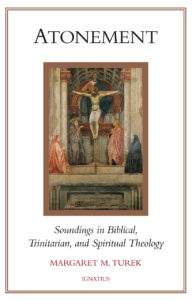Podcast: Play in new window | Download (Duration: 36:26 — 25.1MB) | Embed
Subscribe: Apple Podcasts | Spotify | Amazon Music | Android | Pandora | iHeartRadio | JioSaavn | Podchaser | Gaana | Podcast Index | Email | TuneIn | Deezer | Anghami | RSS | More

Our Participation of Atonement Through the Son – Atonement: Soundings in Biblical, Trinitarian, and Spiritual Theology
Discerning Hearts presents a series of conversations between Dr. Margaret Turek and Evan Collins about her book, “Atonement: Soundings in Biblical, Trinitarian, and Spiritual Theology.”
 You can pick up a copy of the book here:
You can pick up a copy of the book here:
An excerpt from the book:
“However, just as God’s wrath is a modality of love that serves the salvation of his beloved, so God’s self-concealment is a modality of God’s accompaniment that serves the atonement of sin. In the context of a sin-ruptured covenant, God can remain near his beloved while hiding his face. Consider what occurs between the Lord and Israel in Hosea 2:12–22. Israel forsakes the Lord by running after idols. Indeed “everything begins with God’s statement . . . that ‘the land commits great harlotry by forsaking the LORD . . . (1:2). . . . The people have ‘abandoned’ God (4:10) and ‘rebelled’ against him (7:13; 8:1); they have ‘fled’ from him (7:13) and ‘turned to others’ (3:1).”105
On his side, the Lord lets the people endure the God-forsaken state that they have chosen for themselves. He, the forsaken God, lets his people suffer his absence. In concrete historical terms, the Lord hands over Israel to the power of Assyria, and his people are exiled thereto in 722 B.C. Yet though God conceals himself, he nonetheless accompanies Israel into exile (2:12). God withdraws (5:6; 9:12) in order thereby to draw Israel back to himself, for in actuality God’s forgiving love goes in advance of his people, albeit incognito, for the purpose of converting hearts and restoring the covenant relationship.”
Turek, Margaret. Atonement: Soundings in Biblical, Trinitarian, and Spiritual Theology (p. 53). Ignatius Press. Kindle Edition.
From the book’s description:
“This book presents the chief insights concerning the mystery of atonement in the works of four theological guides: John Paul II, Joseph Ratzinger/Benedict XVI, Hans Urs von Balthasar, and Norbert Hoffmann.
The author argues for the central importance and perennial value of a theology of atonement, even as she explains the modern aversion to it. The book’s central aim is to deepen our understanding of the biblical claim that God shows himself to be love precisely by sending his Son as atonement. “In this is love: not that we loved God, but that he loved us and sent his Son as expiation for our sins” (1 Jn 4:10).
The book develops a compelling vision of atonement as a process that originates from and is engendered by God’s own power to love. This vision not only takes account of the gravity of sin and its consequences but also provides a clear illumination of the wholly gratuitous, radically forgiving, passionate and powerful nature of God’s redeeming love for mankind. Distinct from the majority of theological accounts of atonement, which focus almost exclusively on the role of Christ, this book highlights the role of God the Father in the atoning mission of the Son.”

